Darrell Brooks trial: COVID adjournment request denied as 'delay tactic'

Darrell Brooks trial: COVID adjournment request denied as 'delay tactic'
Darrell Brooks requested an adjournment of his trial in the Waukesha Christmas parade attack Wednesday, telling the court he believes he has COVID and needs to wait until at least Friday for test results to come back. Prosecutors said he's heard on jail phone calls telling his mother he's going to delay the trial.
WAUKESHA, Wis. - Darrell Brooks requested an adjournment of his trial in the Waukesha Christmas parade attack Wednesday, Oct. 5, telling the court he believes he has COVID and needs to wait until at least Friday for test results to come back. Prosecutors said he's heard on jail phone calls telling his mother he's going to delay the trial. The judge agreed with the prosecution, calling Brooks' COVID adjournment request "nothing more than a delay tactic."
Waukesha County Judge Jennifer Dorow scheduled Wednesday afternoon's hearing to handle final housekeeping issues before the start of the Brooks trial, with opening statements set for Thursday morning.
An hour in, none of the housekeeping issues had been addressed.
During his court appearance Wednesday afternoon, back in his jail attire because the jury was not present, Brooks sought the adjournment due to the Waukesha County Jail's COVID-19 protocol. Judge Dorow said she offered him the opportunity to wear a suit and tie, as he did Monday and Tuesday, but he declined.
"I’ve had people close to me who have passed away from COVID – I’m frightened," Brooks told the court. In denying Brooks' motion to adjourn, the judge said if he was truly concerned about his health and safety, he would take the COVID rapid test he was offered and refused.
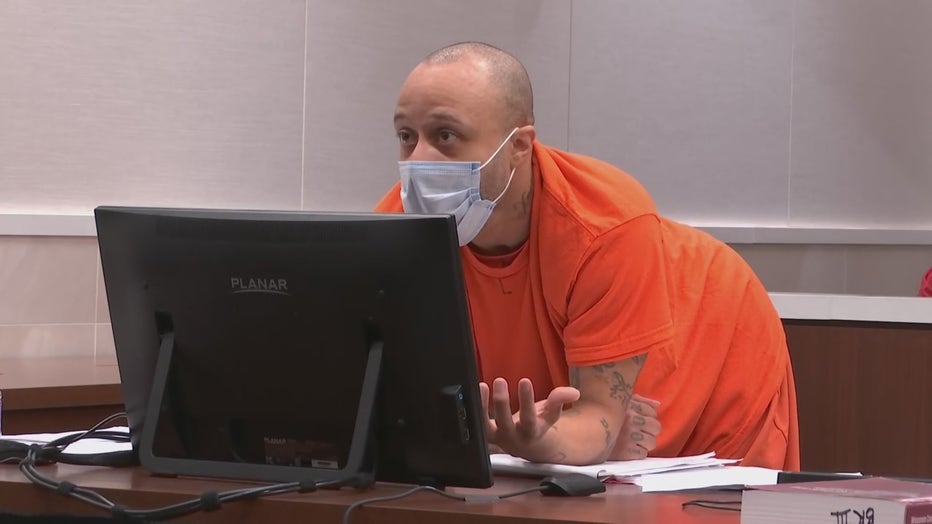
Darrell Brooks
The judge added she did not have any information regarding the COVID-19 protocol and that the jail had not provided her with specifics. Brooks told the judge he is fully vaccinated, but he lost taste and was fatigued. He said he reported the loss of taste to the jail Tuesday night but said he'd been feeling bad "for a few days." Brooks added he was seen by jail nurses and not allowed out of his cell until test results come back, which he said would not be until at least Friday. Brooks insisted the court had this information. Dorow said she had no other information on his COVID status, citing HIPAA.
The judge reiterated that Brooks would have to verify his status within the protocol himself.
Asked if he objected to the judge asking the jail administrator, Brooks said, "Absolutely not." Administrator Angela Wollenhaupt, who oversees staff and inmate issues at the jail, took the witness stand. Wollenhaupt noted that she had not reviewed Brooks' medical record before coming to court, and he had not signed a release to speak to the court about it.
She said if in COVID protocol, Brooks would remain in his current cell and have access to a conference room and phone. She said they would be able to "safely produce him for court."
She added that Brooks made statements that prompted the medical department to follow up, and a COVID test was administered to him.
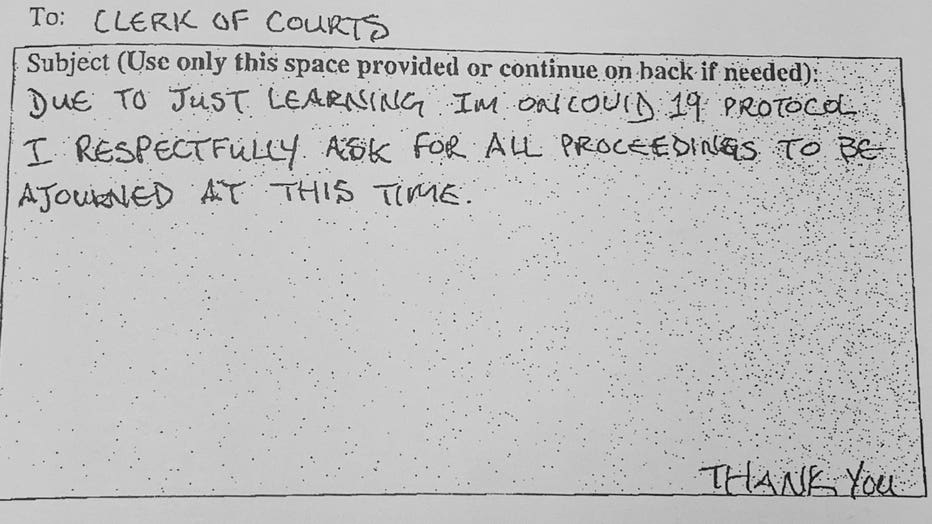
Darrell Brooks COVID adjournment request
Brooks refused to take a rapid test Wednesday, seeking to delay the trial until Friday when his test results come back.
"Why would I need to take two tests for the same thing?" said Brooks. "If I'm taking a COVID test, why would I need to take another one?"
He later followed up with, "I still don't have clarity on that, your Honor. I'm baffled."
When asked if Brooks' discovery materials were in his cell, the jail administrator said yes, and Brooks tried to object. Dorow said he was not able to testify and overruled his objection, giving him a final warning. After almost an hour Wednesday afternoon, Brooks was moved to the courtroom next door because of increased outbursts. Dorow said there were 10 interruptions.
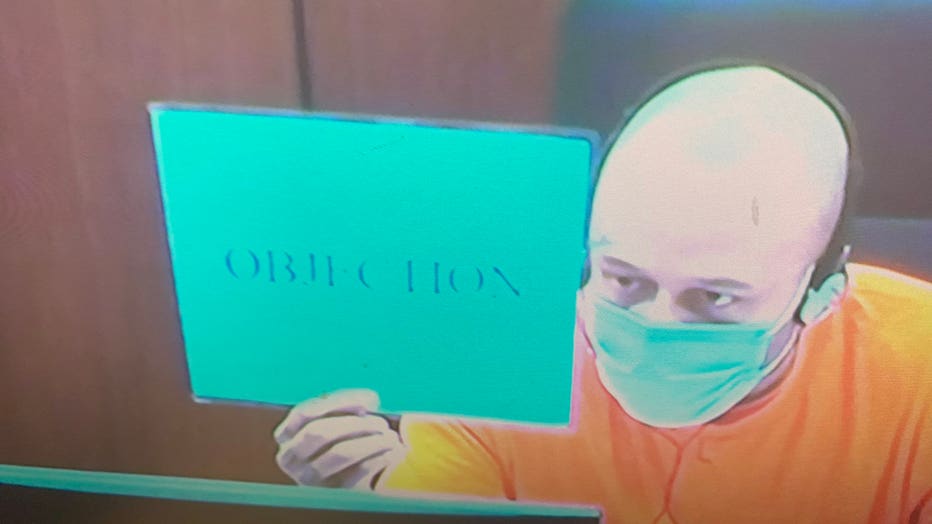
Darrell Brooks objects from the courtroom next door.
The judge pointed out Brooks is not within six feet of anyone else in the courtroom. Brooks dropped his head and shook it while sighing.
Waukesha County District Attorney Susan Opper said she believed Brooks' adjournment request was a delay tactic. Opper said Brooks is heard in recorded jail phone calls telling his mother he plans to delay the trial.
Opper added that even if Brooks was on COVID protocol, it would have zero impact on his ability to prepare for the case, noting he has all necessary materials in his cell.
Brooks asked why the recorded phone calls couldn't be brought into court through a sworn affidavit. "How can that be a delay tactic?" he asked.
The defendant and the judge then began speaking over each other, with Dorow reminding Brooks he needed to abide by the court standards of conduct and Brooks again saying he did not recognize the name placed on the complaint against him. "That's not who I am," he told the court.
Before 4 p.m., Dorow denied Brooks' request for a COVID adjournment.

Darrell Brooks' COVID adjournment request; what it means
Darrell Brooks' requested to adjourn his trial citing COVID-19 protocol, but Judge Jennifer Dorow denied that request. Attorney Ben Lutgen joined FOX6 News to discuss the request and Dorow's handling of Wednesday's court conduct.
Around 4 p.m., Dorow offered Brooks the opportunity to return to the main courtroom. Brooks said he never agreed to move to the adjacent courtroom. The judge took that as a refusal and Brooks remained in the other courtroom.
Brooks noted that he was very tired. The judge noted that the fatigue did not stop Brooks from objecting, interrupting and asking for an appeal.
Housekeeping matters discussed
As the housekeeping matters got underway, the court discussed whether the state should be allowed to ask Brooks, should he take the stand, about his prior convictions, dating back to 1999. The prosecutor noted 12, including three in Nevada.
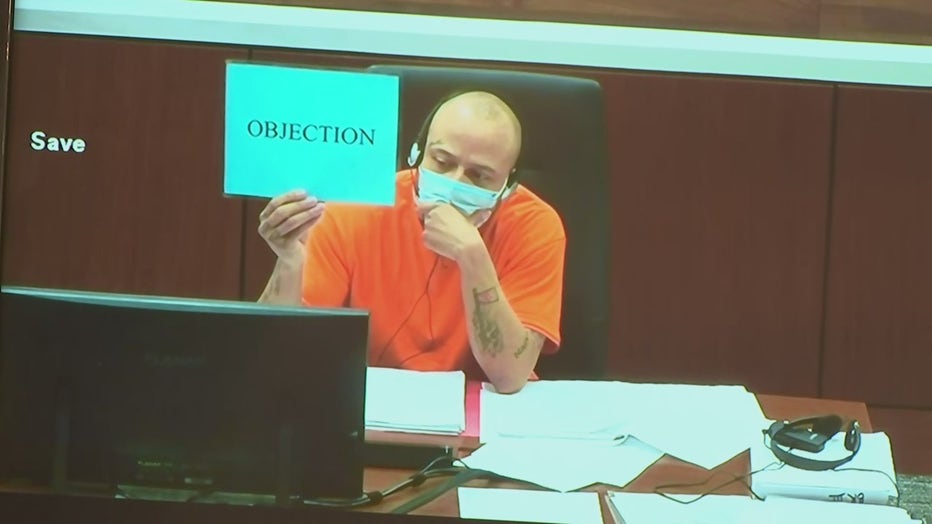
Darrell Brooks
The question would be: "Have you ever been convicted of a crime?" The follow-up question would be: "How many times?"
When asked if he had a question on the use of criminal records, Brooks said he would have a better understanding once he could review things.
Prosecutors will be able to ask about his prior convictions.
The judge said she would rule Thursday on the state's request to reconsider showing victim witnesses. It was previously allowed, except for minors.
Objections discussed
After 4:30 p.m., Dorow began laying out the procedure for objections in court, noting that if Brooks doesn't follow civility procedure, he'll be muted. Dorow said he can use his objection sign, and she'll ask for the basis of his objection.
"If, at any time, you object to every question, that is not acceptable," Judge Dorow said to Brooks, noting statute does not permit harassment.
Dorow and Opper noted the possibility that Brooks could forfeit his right to cross-examine witnesses if he does not act civilly; Opper clarified that the state wants Brooks to be able to cross-examine each witness.
Brooks said he didn't understand, and Dorow said she could not explain the law to him. She stressed that she explained the pros and cons of representing himself, and she told Brooks he intelligently made a deliberate decision to waive counsel while explaining she could not give him legal advice.
"You represent yourself at your own peril," said Judge Dorow.
Brooks again said he didn't understand, and Dorow said he was veering off-topic, muting him.
Jury instructions discussed
The 68-page jury instruction document was discussed, and Dorow said she was adding a page with instructions regarding decorum and courtesy in the courtroom.
"My job includes that making sure Mr. Brooks's rights are protected...that both sides can present the case in a coherent fashion...and that victims and witnesses are treated fairly," said Dorow.
The jury instructions state that if Brooks should appear in the adjacent courtroom during the trial, that should not impact the jury's verdict in any way.
Brooks said he didn't accept or consent to the amended jury instructions as the paperwork was placed in front of him by a bailiff. He said he wants to draft a written jury instruction, and Dorow said he could submit that by Thursday morning for her review.
As jury instructions were discussed, Brooks raised his objection sign and rocked in his chair in the adjacent courtroom. The judge offered to allow Brooks to return to the main courtroom if he would abide by the decorum.
"So this is how it's gonna be the whole trial," said Brooks.
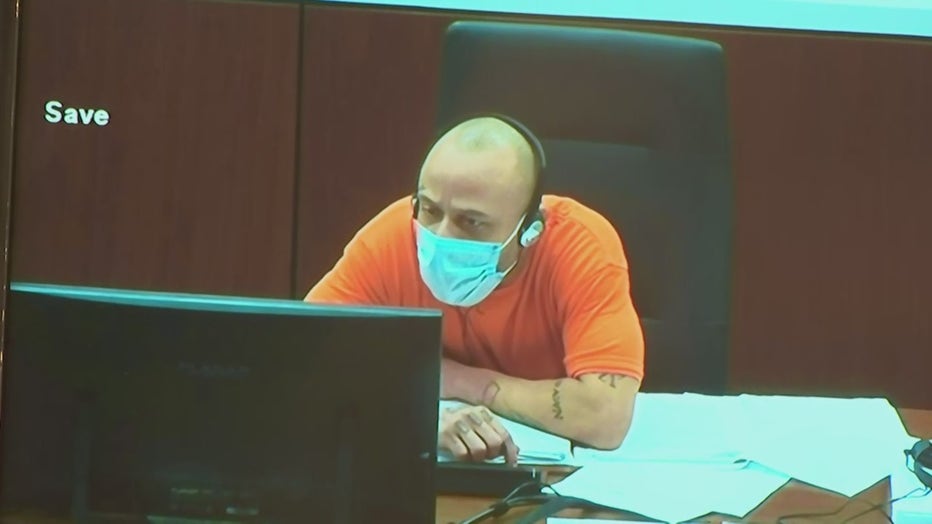
Darrell Brooks
Dorow made a record that Brooks' behavior was rude, disrespectful and an interference in the orderly administration of justice.
"I will not tolerate disruptive conduct that, from my perspective, is simply an attempt to delay," said Dorow.
Brooks noted he's describing himself as "pro per" and not "pro se," as the court sees him in representing himself. He requested that be changed, and Dorow denied it. Brooks continued to push the judge on this issue, and she again muted him, saying she cannot provide legal advice.
When asked if he had any questions on the 69 pages of jury instructions, Brooks asked why the court could not address his to-be written jury instructions Wednesday afternoon.
Shortly thereafter, Judge Dorow approved the 69-page jury instruction packet. The judge said the instructions would be printed for Brooks to review Wednesday night. She said they would discuss some added language Thursday, along with Brooks' written instructions, should he submit them. She noted that his written instructions would be statements of law provided to the jury.
When asked if he objected, Brooks said he did, adding that he didn't understand why changes were being made to the jury instructions at this point. The judge said it's standard protocol to finalize the jury instructions at this hearing.
Exhibits discussed
District Attorney Opper noted the state filed eight pages of 140 exhibits – a combination of videos, photos and documents. She noted the document was provided to Brooks, though he declined to accept it.
Opper said the state has some physical evidence she intends to use later in the trial. She noted some large poster board maps that were prepared. Opper asked specifically about photos and documents and whether they should print a copy for the jury to have later.
The prosecutor asked if all exhibits could be added to one thumb drive and that could be entered into the court record. Brooks held up his objection sign.
The judge wanted all parties to remain at their desk during opening statements. Opper asked if they could move around when Brooks is in the adjacent courtroom, and Dorow said no. She said they can stand up and present, as can Brooks. The judge noted she was taking steps to ensure the jury doesn't see the restraints around Brooks' ankles.
Brooks said most of his exhibits will be paperwork. Dorow said if he has something specific, he should let the state know, so they can make arrangements to assist in displaying it to a witness, if appropriate.
Opper renewed her offer to assist Brooks in helping serve subpoenas for him, so long as they are relevant witnesses for this case in southeastern Wisconsin.
The court went into recess around 5:50 p.m. Judge Dorow said the "final, final" jury instructions would be gone over Thursday morning, along with a motion for reconsideration as to whether victim witnesses can be shown during the trial broadcast.
The jury was ordered to report at 8:30 a.m. for opening statements.
Brooks requests subpoenas
Brooks requested six subpoena forms "as soon as possible" on Tuesday, court filings obtained by FOX6 News show. Twenty-one subpoena forms were delivered to him at the jail Wednesday morning, according to online court records, and Judge Dorow in court said her staff would provide copies, as well.
Before Wednesday's hearing, a crew from Court TV worked to set up a multi-camera system within Judge Dorow's court to best capture the trial for broadcast. FOX6 News will stream the trial in its entirety on the following platforms:
With Brooks' interruptions, court record is crucial
The first three days of the Darrell Brooks trial brought back memories for former prosecutor Paul Bucher.
Bucher was Waukesha County district attorney during the trial of James Oswald.
In April 1994, Oswald and his son, Ted, robbed a bank, killed a police officer, stole a woman's van, held her hostage and after a shoot-out with police, later crashed it.
Oswald represented himself at trial.
Bucher said he's seen similar obstruction tactics now from Brooks, adding that Brooks' behavior puts extra pressure on Judge Dorow to get it right.
"You have to record everything," said Bucher. "You have to put your reasoning in the record for everything because the appellate court -- if he's convicted -- will be reading this off of white paper."
Bucher said Wednesday Dorow has done a good job of that.
16-member jury seated
On Tuesday, the court seated a 16-member jury that includes ten men and six women -- all white. The jury selection process was completed around 6:30 p.m. The jury panel was ordered to return at 8:30 a.m. Thursday for opening statements.
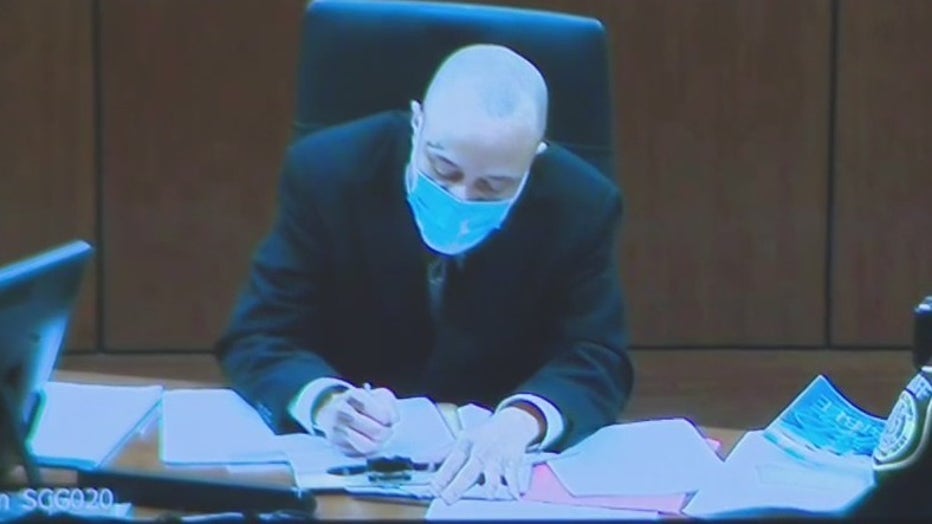
Darrell Brooks trial, jury selection, peremptory strike process
SIGN UP TODAY: Get daily headlines, breaking news emails from FOX6 News
Now that the jury is selected, FOX6 News can tell you the potential jurors were asked more than 100 questions, including:
- Do you accept Brooks is innocent until proven guilty?
- Do you have bias for or against Brooks because of his race?
- Have you seen, heard or read any news coverage on the case?
Christmas parade attack
Prosecutors say Brooks drove a red SUV through the parade route on Nov. 21, 2021, killing six and injuring more than 60 others.
On Nov. 21, 2021, according to prosecutors, Brooks met up with his ex-girlfriend in Frame Park, the same woman he is accused of running over with his red SUV earlier in November 2021. She told police they argued in his SUV before he started driving, and he "was driving around with one hand and striking her in the face with his other hand." She eventually got out and called her friends for help.
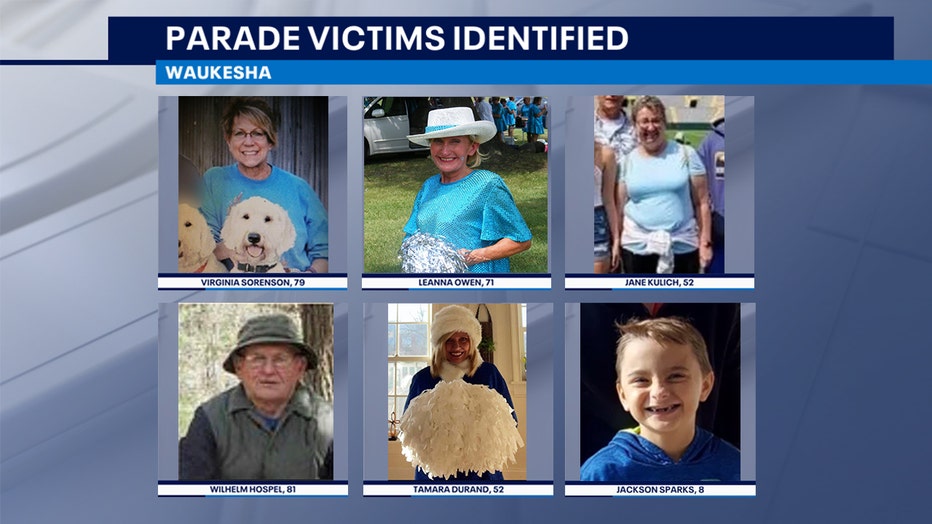
Waukesha parade attack victims identified
Soon after that, according to prosecutors, Brooks drove that red SUV through the parade route, killing Jackson Sparks, 8, Virginia Sorenson, 79, LeAnna Owen, 71, Tamara Durand, 52, Jane Kulich, 52 and Wilhelm Hospel, 81. More than 60 others were hurt.
Brooks was arrested the night of the attack, soon after telling a Waukesha resident that he was homeless and waiting for an Uber. The man was unaware of the events that had occurred and let Brooks into his home.
FREE DOWNLOAD: Get breaking news alerts in the FOX6 News app for iOS or Android
Brooks entered an insanity plea in June after initially pleading not guilty to the charges in February, a move that could have resulted in him being sentenced to a mental institution rather than prison if convicted. He later dropped the insanity plea on Sept. 9.
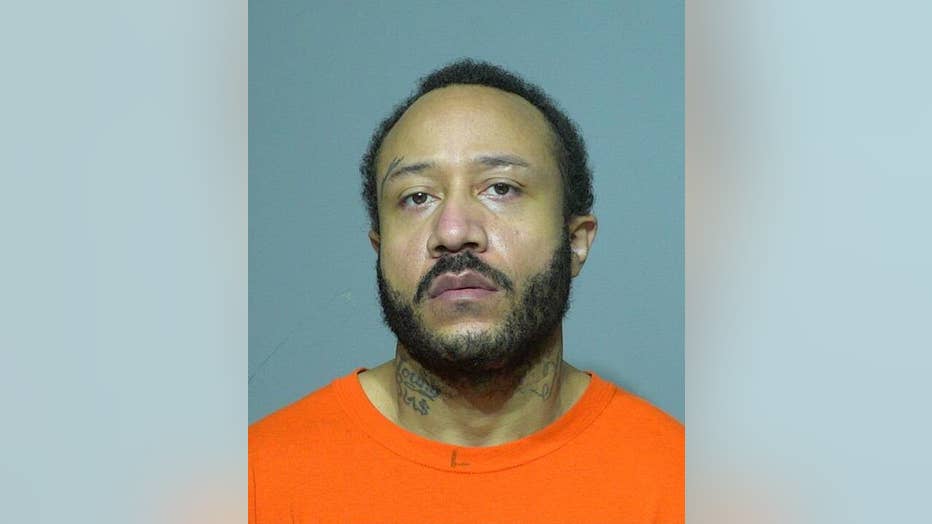
Darrell Brooks
Darrell Brooks faces 76 charges, including six counts of first-degree intentional homicide and 61 counts of reckless endangerment. Each homicide charge carries a mandatory life sentence.

